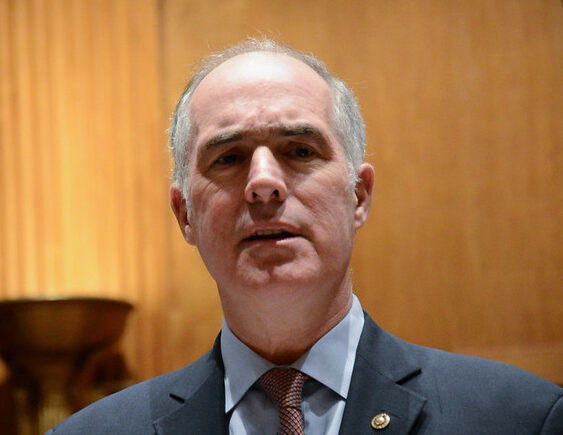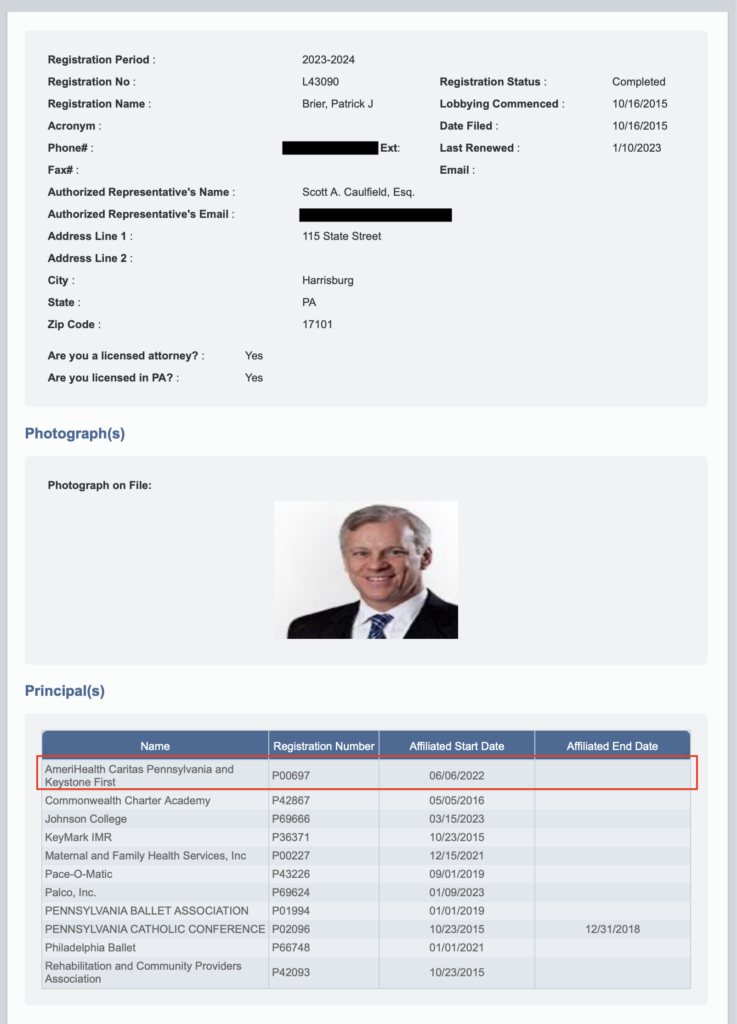After Sen. Casey Ignited Investigations into Some Medicaid Companies, His Brother-in-Law Started Lobbying for One

This article first appeared in Broad + Liberty.
Sen. Bob Casey’s brother-in-law began state-based lobbying for a Medicaid managed-care company last year, just months before a pivotal and likely damaging report on the health care company from the U.S. Department of Health and Human Services was poised for release.
The federal audit into Keystone First and other similar companies by the U.S. Department of Health’s inspector general came after Casey (D) pushed for it in the wake of an investigative reporting series by the Dallas Morning News alleging some Medicaid managed care organizations, or MCOs, were boosting profits by denying care or benefits to patients.
“Of the 50 pediatric skilled nursing service request denials in our sample, 10 were completely denied when they should have been partially allowed,” the audit found. It gave a special focus to pediatric skilled nursing payment requests “because of the vulnerability of the pediatric population and due to concerns raised in the Dallas Morning News article.”
The audit further noted that Keystone First was selected for the audit, “because it had the highest number of denied services of any Medicaid MCO in Pennsylvania during calendar years 2018 and 2019 (audit period).”
Casey’s brother-in-law, Patrick Brier, registered as a lobbyist for Keystone First with the Pennsylvania Department of State in June 2022. The inspector general for the U.S. Department of Health released its audit in December that year, days before Christmas.
Brier’s lobbying registration qualified him for that kind of work only at the state level.

“Mr. Brier is not now and never has been engaged as a federal lobbyist on behalf of Keystone First,” said Scott Caulfield, a Harrisburg attorney who, according to his own description, specializes in “professional compliance and ethics due diligence work.” Caulfield is listed as an authorized representative on Brier’s lobbyist registration, and said in an email he was also authorized by Brier to answer on his behalf in response to questions from Broad + Liberty.
“In fact, Mr. Brier does not engage in any federal lobbying work whatsoever. Mr. Brier does not receive any compensation from, or have any financial interest(s) relating to, any firm or other person that lobbies any member of the United States Congress, for any purpose,” Caulfield concluded.
While it is true Brier has not been engaged as a federal lobbyist on behalf of Keystone First, Caulfield did not contest the assertion Brier has done state-based lobbying for the company.
Regardless, Brier’s work for the MCO, especially considering the close timing to the release of the audit, could give the perception of a conflict of interest given that the audit was largely spurred by Sen. Casey.
Sen. Casey’s office did not respond to a request for comment. A message requesting comment from Keystone First was not immediately returned.
The issue of a conflict of interest between Casey and Brier has come up before, in 2002.
Brier was part of a law firm that helped a Luzerne County-based nursing home negotiate a settlement with the federal government after it was found the nursing home had over $2 million “in Medicare overcharges to the federal government and unspecified Medicaid undercharges to the state government between 1990 and 1997,” according to a report from the Wilkes Barre Times-Leader.
Casey was criticized by citizens and local officials in his home county for taking credit in campaign commercials during the 2002 Democratic gubernatorial primary against former Philadelphia Mayor Ed Rendell for exposing financial corruption in nursing homes as auditor general, but somehow failed to notice the problems at the Luzerne-based home, Valley Crest. Critics at the time suggested Casey failed to sufficiently challenge officials in his own party who had long supported his political aspirations.
One elected official at the time “questioned whether the Democratic commissioners decided to hire a firm [for the settlement negotiations] with ties to Casey as a safeguard against a state audit,” the Times-Leader reported.
Casey responded by saying that the only reason people were aware of the familial connection was because he had proactively listed it on a disclosure form as something would likely be perceived as a conflict of interest.
Two other stories this year have also put Casey under the ethical spotlight.
In February, Politico reported that “Patrick Casey, the brother of Pennsylvania Democratic Sen. Bob Casey who joined Dentons Global Advisors Government Relations last year as a partner, registered to lobby in the fall, and reported lobbying the Senate on issues ranging from implementation of the CHIPS and Science Act to online travel policies last year, disclosures show.”
Just this week, the New York Post reported that Casey’s other brother, Matt, works at a personal-injury law firm which has donated “hundreds of thousands” to Casey’s campaigns over the years, and Casey “has tapped one of [the firm’s] partners to help him nominate federal judges.”
The story also noted that the nominating process mentioned was part of a “mutually beneficial” agreement between Casey and now retired Senator Pat Toomey, a Republican. As part of that agreement “each [would] appoint a co-chair and 10 panel members on a bipartisan basis to vet federal judicial nominees for the Eastern District of Pennsylvania starting in 2011, according to a comtemporary [sic] Casey press release,” the Post story said.
Finally, the Republican site Breitbart noted that in 2018, Casey was months late filing a required disclosure of a stock sale of an Ohio energy company by one of his children. The sale was notable because the company at issue, which also had power plants in western Pennsylvania, was heavily lobbying the federal government on regulatory issues while one of the company’s subsidiaries was facing bankruptcy.
Broad + Liberty followed up on that story by requesting comment again from Casey on that issue, but that request was not returned.
No one has yet formally announced a campaign to run against Casey, the Scranton Democrat who is serving in his third term. It’s also no secret that Dave McCormick, a businessman and former under secretary of the U.S. Treasury for International Affairs who lost a Senate bid in 2020 to fellow Republican Mehmet Oz, is likely to run again in 2024.


